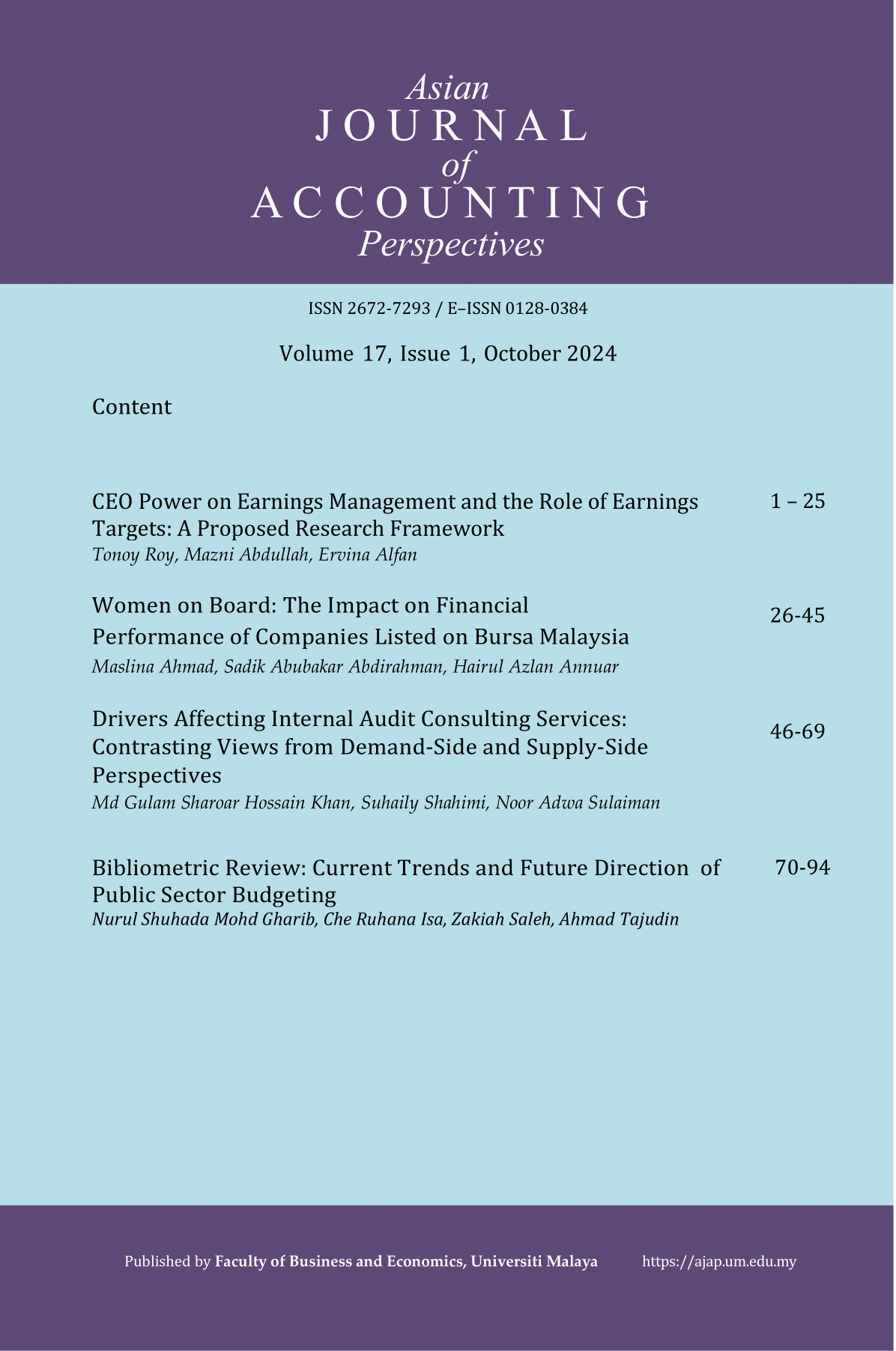CEO Power on Earnings Management and the Role of Earnings Targets: A Proposed Research Framework
DOI:
https://doi.org/10.22452/AJAP.vol17no1.1Keywords:
CEO power, Earnings management, Earnings target, Agency theory, Upper echelons theoryAbstract
Research aim: This paper aims to present a conceptual framework for CEOs that abuse their power to manage earnings, and the pressure of attaining earnings targets moderating the effect of this power abuse on earnings management (EM).
Design/ Methodology/ Approach: To develop the proposed conceptual framework, this study performed a comprehensive literature review consisting of theoretical discussions and comparative arguments. The development of the framework also involved analysing and summarising the contributions, limitations, and suggestions from previous studies. Following this approach, the conceptual framework was built addressing issues related to CEO power, EM, and earnings targets.
Research finding: Based on the propositions, the proposed research framework expects a significant positive effect of CEO power on EM, and that the pressure of attaining earnings targets will significantly moderate the CEO power and EM nexus among Malaysian listed firms. Malaysian CEOs with more power are expected to manage earnings more easily, and the pressure of attaining earnings targets is expected to influence powerful CEOs to manage earnings.
Theoretical contribution/ Originality: The proposed conceptual framework adds new perspectives to the existing literature by explaining the linkages between CEO power, earnings targets, and EM based on agency theory and upper echelons theory. Moreover, the harmonisation between the Type I agency problem and upper echelons theory is a novel contribution. The framework highlights the influence of the pressure of earnings targets on powerful CEOs’ EM practices. Moreover, two conditions for considering the effect of earnings targets are proposed.
Practitioner/ Policy implication: Malaysian audit firms and listed companies can shape their accounting and monitoring strategies based on the eight formulated propositions. Moreover, this paper will also enable Malaysian regulators and standard setters to revise the existing Malaysian Code on Corporate Governance (MCCG).
Research limitation: This is only a conceptual paper that requires an empirical study with quantitative data to test the propositions and validate the proposed conceptual framework. Hence, the anticipated practical implications are subjected to future empirical validation.
Keywords: CEO power, Earnings management, Earnings target, Agency theory, Upper echelons theory
Type of article: Conceptual paper
JEL Classification: M12, M41
Downloads
Downloads
Published
How to Cite
Issue
Section
License
LicenseLicense
The Asian Journal of Accounting Perspectives (AJAP) articles are published under a licence equivalent to the Creative Commons Attribution-NonCommercial-NoDerivs License (CC BY-NC-ND). The licence allows users to copy, distribute, and transmit an article as long as the author is attributed. The article is not used for commercial purposes. The work is not modified or adapted in any way.
Copyright
Authors are required to sign the Exclusive License to Publish agreement upon publication in the AJAP. The agreement grants the Publisher (Faculty of Business and Accountancy, Universiti Malaya) to publish and disseminate the articles.
Open Access
Articles published in the AJAP are digital, online, free of charge, and free of most copyright and licensing restrictions.
Article Processing Charge
Articles publish in AJAP is free submission, production and publication charges. However, all accepted articles are required for language editing. The AJAP officially appointed and outsourced proofreader will conduct this process, and the authors will cover the cost. AJAP does not profit from this process and transaction.

